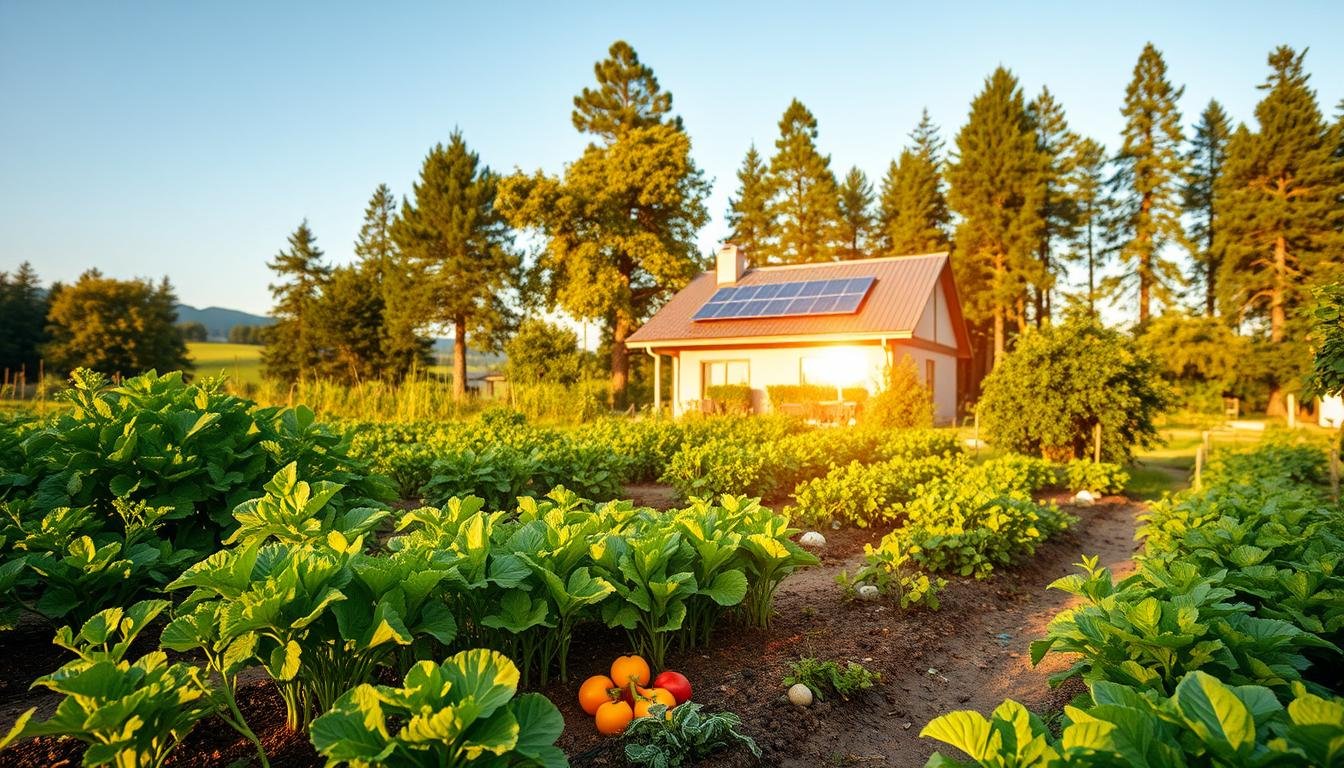As we aim for a greener future, finding sustainable waste solutions is key. This article explores how we can tackle waste management challenges. We’ll look into the eco-conscious approach.
We’ll focus on teaching and explaining the benefits and techniques for a sustainable future. Join us on this educational journey to positively impact the environment.
Understanding the Need for Sustainable Waste Solutions
An eco-conscious approach to waste management is vital for a healthy planet. Sustainable waste solutions reduce waste’s negative impact on the environment. For example, recycling paper and plastic saves natural resources and cuts pollution.
Composting organic waste diverts it from landfills and enriches soil for agriculture. These simple actions have a big positive impact on our ecosystems. Adopting sustainable waste solutions is essential for a greener future for all generations.
Benefits of Embracing an Eco-Conscious Approach
Adopting an eco-conscious approach benefits the environment and us. It preserves natural resources and reduces pollution.
Using renewable energy sources like solar panels decreases fossil fuel use. Eco-friendly products reduce waste and promote a healthier lifestyle.
Choosing reusable items like shopping bags and water bottles cuts plastic waste. So, an eco-conscious approach helps us all create a sustainable future.
Prominent Sustainable Waste Solutions
Recycling and Upcycling Initiatives
Recycling and upcycling are key to an eco-conscious approach. They involve repurposing materials and reducing waste to protect the environment.
Recycling paper and plastic saves resources and reduces landfills. Upcycling old clothing into new items reduces waste and promotes creativity. These efforts reduce the demand for new resources and waste.
A. Recycling Programs in Cities and Communities
Recycling programs in cities and communities are vital. They encourage responsible waste disposal and contribute to sustainability.
Residents can separate recyclables from trash and use recycling bins. These items are processed into new products.
Participating in recycling programs reduces landfill waste and conserves resources. It promotes environmental awareness and positively impacts the planet.
B. Innovative Upcycling Projects
Innovative upcycling projects are practical for reducing waste and promoting sustainability. They transform discarded materials into useful and beautiful products. For instance:
- Repurposing glass bottles into stylish light fixtures.
- Turning old wooden pallets into functional furniture pieces.
- Transforming discarded textiles into fashionable accessories.
- Upcycling used wine corks into unique coasters or bulletin boards.
These creative projects divert waste from landfills and encourage a circular economy. They give old items new life, contributing to a sustainable future and adding uniqueness to our lives.
Composting
Composting is a great way to be more eco-friendly. It turns organic waste into soil that’s full of nutrients. This not only cuts down on landfill waste but also makes your garden healthier.
For example, you can compost food scraps like fruit peels, coffee grounds, and veggie scraps. This makes the soil in your garden super rich in nutrients.
Yard waste, like leaves and grass clippings, can also be composted. This reduces waste and gives you a green alternative to chemical fertilizers. Composting teaches us about the natural cycle of decay and shows us how important it is to manage waste well.
A. Household Composting Techniques
Composting is a smart way to handle waste at home. It turns waste into compost that’s good for your garden. Here are some easy ways to start composting at home:
- Vermicomposting: This method uses worms to break down kitchen scraps. It’s perfect for small spaces and needs little care.
- Backyard composting: Great for those with more space, it involves making a compost pile or using a bin. It breaks down yard trimmings and food waste.
- Trench composting: Good for small-scale composting, it involves burying waste in the soil. It feeds the soil and speeds up decay.
- Bokashi composting: This method uses special bran and microbes to quickly break down waste. It’s great for composting a variety of food scraps.
These methods make it easy to compost at home. They help make your garden healthier and reduce waste.
B. Large-scale Composting Facilities
Big composting facilities are key in managing waste. They mix food waste and yard trimmings to make compost. This compost is good for farms, gardens, and landscaping.
These facilities are good at keeping waste out of landfills. By composting, they cut down on methane emissions. Methane is a strong greenhouse gas.
They also help by putting nutrients back into the soil. This supports farming and saves resources by cutting down on chemical fertilizers.
Waste-to-Energy Conversion
Turning waste into energy is a smart move. It uses waste to make energy, helping our planet. For example, organic waste can be turned into biogas. This biogas can power homes or businesses.
Thermal conversion can also turn waste into energy. It’s a way to use waste that can’t be recycled. This method cuts down on landfill waste and emissions.
A. Anaerobic Digestion
A. Anaerobic Digestion breaks down organic waste into biogas and fertilizer. It happens in a tank where bacteria work without oxygen. The biogas can power homes or businesses, reducing fossil fuel use.
The leftover fertilizer is natural and cuts down on synthetic fertilizers. This method is good for managing organic waste. It helps recover resources and lowers emissions in farming, food processing, and wastewater treatment.
B. Incineration and Energy Recovery
Implementing an Eco-Conscious Approach
Encouraging Sustainable Practices at the Individual Level
It’s key to encourage sustainable practices at the individual level. Small changes in our daily lives can greatly impact the environment. For example, taking shorter showers and using public transport can help a lot.
Choosing reusable products over single-use ones also helps. Using reusable bags and water bottles reduces waste. These actions, when done by many, can lead to a better future for our planet.
A. Reducing Single-Use Plastics
Reducing single-use plastics is a big step towards being eco-friendly. By using less disposable plastics, we can lessen their harm to the environment.
Switching to reusable water bottles and cloth bags for shopping cuts down plastic waste. These simple steps can make a big difference in reducing plastic waste. Together, we can help keep our planet healthy.
B. Reusing and Repurposing Items
Being eco-conscious means reusing and repurposing items. This not only cuts down waste but also supports sustainability. For instance, giving old furniture a new look or using old t-shirts for cleaning rags is smart.
Thinking this way can greatly reduce our impact on the environment. It encourages a greener lifestyle for everyone.
Corporate Responsibility and Collaboration
Corporate responsibility and collaboration are key to an eco-conscious approach. Companies can play a big role in a sustainable future by adopting these practices. Working together, businesses can share innovative solutions and best practices.
For example, companies can team up to find eco-friendly packaging materials or use renewable energy. Showing corporate responsibility through waste reduction programs or supporting local communities is also important. This way, companies can positively impact the environment and society.
A. Adopting Sustainable Packaging Solutions
As we become more eco-conscious, using sustainable packaging is vital. This can include using biodegradable or recyclable materials. It also means designing packaging that uses less material, saving costs and the environment.
Using packaging that can be reused or repurposed is another good approach. This supports a circular economy and helps create a greener future.
B. Partnering with Waste Management Companies
Working with waste management companies is a smart move for businesses going green. These partnerships ensure waste is disposed of properly and recycled.
Waste management companies use advanced recycling to reduce landfill waste. This promotes a sustainable future.
Through partnerships, businesses can get tailored waste reduction plans. This includes efficient sorting systems and composting initiatives. Working with waste management companies helps businesses contribute to a greener environment.
Procter & Gamble’s Zero Waste Initiative
Procter & Gamble is leading the way with its Zero Waste Initiative. This effort aims to cut down on waste and protect the environment. The company uses smart strategies to reduce waste at every stage of product life.
For example, they’ve come up with creative packaging and improved their manufacturing. This has greatly reduced waste during production.
They also focus on recycling and finding new uses for materials. This shows their commitment to being green. Procter & Gamble is setting a good example for others to follow.
A. Eliminating Packaging Waste
Packaging waste is a big problem, and companies need to think about it. By cutting down on packaging, they can help the planet. Using biodegradable materials instead of plastic can make a big difference.
They’re also finding new ways to package things. This means using less material and making less waste. It’s a step towards a greener future.
B. Reusing Materials for Production
Reusing materials is good for the environment. It means less waste and less need to get new resources. For example, turning old plastic bottles into clothes is a great idea.
Recycling metal is another smart move. It saves energy and cuts down on pollution. It’s a big step towards being more sustainable.
Unilever’s Sustainable Packaging Innovations
Unilever is a leader in making packaging better for the planet. They’re using recycled materials and exploring new options. This shows their commitment to being green.
They’re looking into biodegradable and compostable packaging too. This is a big step towards a more sustainable future. Unilever is leading the way and inspiring others.
A. Pioneering the use of Recycled Plastics
Companies are starting to use recycled plastics more. This is good for the environment because it reduces the need for new plastics. For example:
- Clothing brands are using recycled plastics in their fabrics.
- Furniture companies are making stylish pieces from recycled plastics.
- The car industry is using recycled plastics in car parts.
This helps the planet and encourages others to do the same. It’s a big step towards a circular economy.
B. Investing in Biodegradable Packaging Options
Biodegradable packaging is important for companies that care about the planet. These materials, like compostable plastics, are better than traditional ones. They help reduce waste and promote sustainability.
These materials break down naturally, reducing landfill waste. It’s a responsible choice for businesses.
Key takeaways
Creating a greener future is all about managing waste better. By being eco-conscious, we can make a big difference. We need to reduce, reuse, and recycle more.
Proper waste management and using renewable energy are key. Education helps us all make better choices. Together, we can make a more sustainable world.







